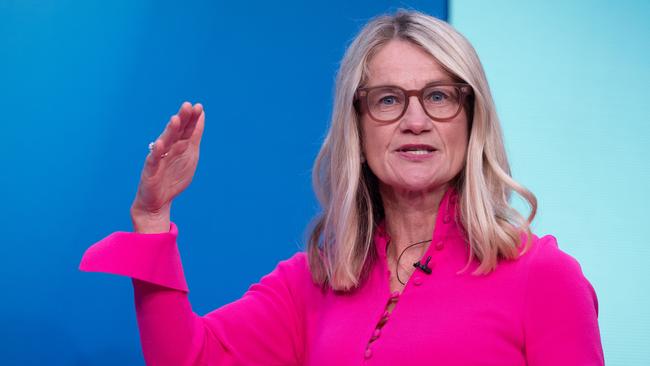Super scandals raise pressure on funds to run their operations in-house, says Aware’s chief
Super funds are under pressure to bring their administration in-house as concern grows over the mishandling of insurance claims, Aware Super’s chief executive says.

Superannuation funds face pressure to bring the administration of their operations in-house as concern grows over the mishandling of insurance claims across the industry, the $185bn giant Aware Super says.
Aware Super chief executive Deanne Stewart said she believed more funds would look at taking over at least part of the administration themselves as they sought to cater for the needs of the increasing number of members moving into retirement.
Ms Stewart’s comments come as super funds are under pressure from regulators to step up their game in servicing members and in handling insurance claims.
The Australian Securities and Investments Commission has recently taken $94bn construction industry super fund Cbus to court over delays in processing member claims for death benefits and total and permanent disability claims.
The regulator also is believed to be looking at taking action against other super funds for delays in their processing of insurance claims.
“More and more funds will look at the different components of their operations, and whether it makes sense for them to do it themselves or take at least part of their operations in-house,” Ms Stewart told The Australian.
She said she expected larger super funds would be investing significantly in technology and in upgrading the digital experience for their members.
“Members are wanting their interaction with their super funds to be as seamless and as simple as possible,” she said. “And they want a lot of things done immediately. Digital is certainly going to be a key part of that.”
Cbus chairman Wayne Swan criticised the performance of external super fund administrator the Link Group for the problems in claims handling.
Link rejected the criticism, and financial regulators made it clear last week that it was the super fund trustees who were on the hook for any administration shortcomings of their funds, regardless of whether they used external managers.
Aware, which has 1.1 million members, is not expected to be included in the list, given its significant investment in bringing its fund management in-house and in digitising its operations, which it completed last year.
But Ms Stewart said it would be good if there were a standardisation of the processes in super funds’ handling of insurance claims. “Having clear service standards that mean end-to-end time frames is what ASIC is referring to, so there is visibility, and members can compare the service they get from one fund to another, is only a good thing for the industry in the long run,” Ms Stewart said.
Standards could be developed by the industry in conjunction with regulators such as the Australian Prudential Regulation Authority.
Ms Stewart would not reveal how much Aware invested in upgrading its systems, describing it only as “a lot”.
The fund finalised the migration of its members to a new digital cloud-based Bravura Sonata Alta program last year after a three-year process in which Aware took its administration in-house.
The fund ended its longstanding contract with Mercer, which handled administration for many of its members in the past.
Ms Stewart said the program began when the fund was handling the mergers behind its creation involving First State Super, VicSuper, WA Super and StatePlus.
As the fund looked at the challenge of merging the back office processing of the different funds, it decided to make a major investment that would allow it to “leapfrog” other funds in digitising the business and support much faster customer service.
“That was about using our scale wisely,” she said. “We made a really significant investment to get a much better member experience. We were really keen to lead the way and bring about a really seamless experience for members.”
Ms Stewart said super funds needed to consider which approach was more efficient for their own circumstances.
The challenge for super funds was “to make it as seamless as possible” for members to deal with them.
“If members have to go from the (external super fund) administrator, to the insurer to the super fund (in seeking to get an insurance claim handled), that is a lot of time wasted and a lot of frustration,” she said.
“There can be a lack of visibility about where (their insurance claim) is at.”
When First State Super of NSW merged with Vic Super, the Victorian fund was already internally managed and using a technology provider.
“We were able to build on that capability and skill set already,” Ms Stewart said. “We could see that it gave the fund a lot more control over the member experience. We had something to build on and we didn’t have to start from scratch.
“Super funds need to consider what is the most efficient process for them, what creates the best member experience and what capabilities they have.”
She said Aware felt it already had the capability and skill set to build on and bring the rest of the fund’s operations in-house.
“For us, having much more control over the member experience meant insourcing was the better answer and also happened to be the most efficient.”
Aware’s changes mean most transactions between members and the fund are digital.
“Some 85 per cent of transactions are straight through online,” Ms Stewart said.
“If you are in pension phase and you need your money, it is automated. Very few super funds have all those elements completely automated.”




To join the conversation, please log in. Don't have an account? Register
Join the conversation, you are commenting as Logout